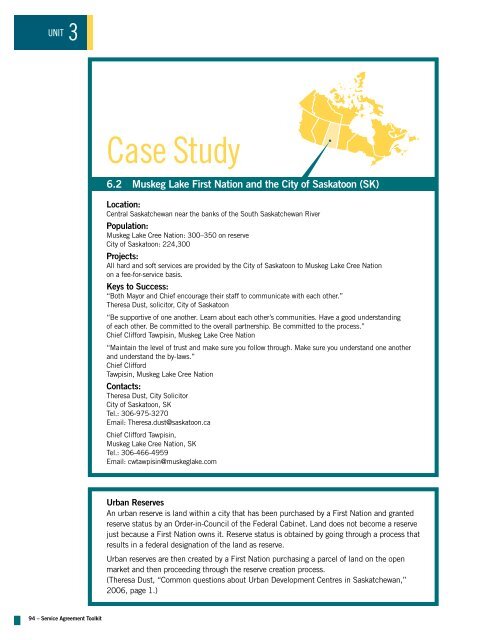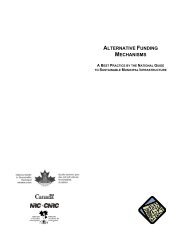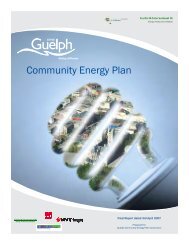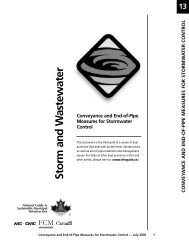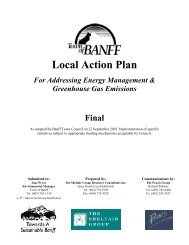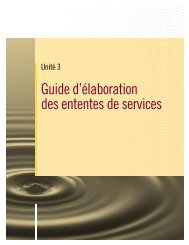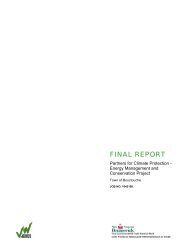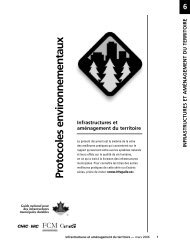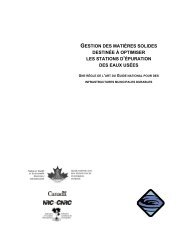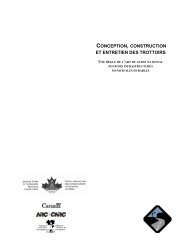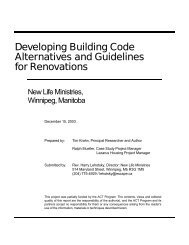Muskeg Lake First Nation and the City of Saskatoon - FCM
Muskeg Lake First Nation and the City of Saskatoon - FCM
Muskeg Lake First Nation and the City of Saskatoon - FCM
Create successful ePaper yourself
Turn your PDF publications into a flip-book with our unique Google optimized e-Paper software.
UNIT 23<br />
94 – Service Agreement Toolkit<br />
Case Study<br />
6.2 <strong>Muskeg</strong> <strong>Lake</strong> <strong>First</strong> <strong>Nation</strong> <strong>and</strong> <strong>the</strong> <strong>City</strong> <strong>of</strong> <strong>Saskatoon</strong> (SK)<br />
Location:<br />
Central Saskatchewan near <strong>the</strong> banks <strong>of</strong> <strong>the</strong> South Saskatchewan River<br />
Population:<br />
<strong>Muskeg</strong> <strong>Lake</strong> Cree <strong>Nation</strong>: 300–350 on reserve<br />
<strong>City</strong> <strong>of</strong> <strong>Saskatoon</strong>: 224,300<br />
Projects:<br />
All hard <strong>and</strong> s<strong>of</strong>t services are provided by <strong>the</strong> <strong>City</strong> <strong>of</strong> <strong>Saskatoon</strong> to <strong>Muskeg</strong> <strong>Lake</strong> Cree <strong>Nation</strong><br />
on a fee-for-service basis.<br />
Keys to Success:<br />
“Both Mayor <strong>and</strong> Chief encourage <strong>the</strong>ir staff to communicate with each o<strong>the</strong>r.”<br />
Theresa Dust, solicitor, <strong>City</strong> <strong>of</strong> <strong>Saskatoon</strong><br />
“Be supportive <strong>of</strong> one ano<strong>the</strong>r. Learn about each o<strong>the</strong>r’s communities. Have a good underst<strong>and</strong>ing<br />
<strong>of</strong> each o<strong>the</strong>r. Be committed to <strong>the</strong> overall partnership. Be committed to <strong>the</strong> process.”<br />
Chief Clifford Tawpisin, <strong>Muskeg</strong> <strong>Lake</strong> Cree <strong>Nation</strong><br />
“Maintain <strong>the</strong> level <strong>of</strong> trust <strong>and</strong> make sure you follow through. Make sure you underst<strong>and</strong> one ano<strong>the</strong>r<br />
<strong>and</strong> underst<strong>and</strong> <strong>the</strong> by-laws.”<br />
Chief Clifford<br />
Tawpisin, <strong>Muskeg</strong> <strong>Lake</strong> Cree <strong>Nation</strong><br />
Contacts:<br />
Theresa Dust, <strong>City</strong> Solicitor<br />
<strong>City</strong> <strong>of</strong> <strong>Saskatoon</strong>, SK<br />
Tel.: 306-975-3270<br />
Email: Theresa.dust@saskatoon.ca<br />
Chief Clifford Tawpisin,<br />
<strong>Muskeg</strong> <strong>Lake</strong> Cree <strong>Nation</strong>, SK<br />
Tel.: 306-466-4959<br />
Email: cwtawpisin@muskeglake.com<br />
Urban Reserves<br />
An urban reserve is l<strong>and</strong> within a city that has been purchased by a <strong>First</strong> <strong>Nation</strong> <strong>and</strong> granted<br />
reserve status by an Order-in-Council <strong>of</strong> <strong>the</strong> Federal Cabinet. L<strong>and</strong> does not become a reserve<br />
just because a <strong>First</strong> <strong>Nation</strong> owns it. Reserve status is obtained by going through a process that<br />
results in a federal designation <strong>of</strong> <strong>the</strong> l<strong>and</strong> as reserve.<br />
Urban reserves are <strong>the</strong>n created by a <strong>First</strong> <strong>Nation</strong> purchasing a parcel <strong>of</strong> l<strong>and</strong> on <strong>the</strong> open<br />
market <strong>and</strong> <strong>the</strong>n proceeding through <strong>the</strong> reserve creation process.<br />
(Theresa Dust, “Common questions about Urban Development Centres in Saskatchewan,”<br />
2006, page 1.)
<strong>Saskatoon</strong> is centrally located in <strong>the</strong> province<br />
<strong>of</strong> Saskatchewan on <strong>the</strong> banks <strong>of</strong> <strong>the</strong><br />
South Saskatchewan River. The <strong>Saskatoon</strong><br />
area has been inhabited for 6,000 years <strong>and</strong><br />
was first settled by Europeans in 1883.<br />
The first urban reserve in Canada was created<br />
in 1998 in <strong>Saskatoon</strong> by <strong>Muskeg</strong> <strong>Lake</strong><br />
<strong>First</strong> <strong>Nation</strong>. This new reserve was a result <strong>of</strong><br />
<strong>the</strong> Federal Additions to Reserve Policy. “It<br />
was unique because <strong>of</strong> a series <strong>of</strong> agreements<br />
between <strong>the</strong> city <strong>and</strong> <strong>Muskeg</strong> <strong>Lake</strong><br />
regarding compatible l<strong>and</strong> use, services <strong>and</strong><br />
tax loss compensation,” said Theresa Dust,<br />
<strong>City</strong> <strong>of</strong> <strong>Saskatoon</strong> solicitor.<br />
Service agreements<br />
Before signing <strong>the</strong> first service agreement<br />
with <strong>the</strong> <strong>City</strong> <strong>of</strong> <strong>Saskatoon</strong> in 1988, <strong>the</strong><br />
<strong>Muskeg</strong> <strong>Lake</strong> urban reserve was a large,<br />
unserviced site. The first service agreement<br />
took some time to finalize because both<br />
parties were unfamiliar with <strong>the</strong> process <strong>and</strong><br />
implications <strong>of</strong> creating a reserve within <strong>the</strong><br />
city. It was a learning process for everyone.<br />
However, both <strong>the</strong> Mayor <strong>of</strong> <strong>Saskatoon</strong> <strong>and</strong><br />
Chief <strong>of</strong> <strong>Muskeg</strong> <strong>Lake</strong> were determined that<br />
<strong>the</strong> creation <strong>of</strong> an urban reserve should materialize<br />
for economic development reasons.<br />
The creation <strong>of</strong> <strong>the</strong> <strong>Muskeg</strong> <strong>Lake</strong> urban<br />
reserve <strong>and</strong> <strong>the</strong> signing <strong>of</strong> <strong>the</strong> service agreement<br />
created economic, social <strong>and</strong> cultural<br />
opportunities for both communities. It also<br />
provided opportunities for new businesses,<br />
which means potential jobs for <strong>the</strong> growing<br />
number <strong>of</strong> <strong>First</strong> <strong>Nation</strong>s living in urban<br />
centres. The city benefits from <strong>the</strong> economic<br />
spin<strong>of</strong>fs <strong>of</strong> <strong>the</strong>se new jobs <strong>and</strong> residents<br />
benefit from <strong>the</strong> services <strong>of</strong>fered by <strong>the</strong><br />
new businesses <strong>and</strong> amenities located<br />
on <strong>the</strong> l<strong>and</strong>s.<br />
The l<strong>and</strong> uses on <strong>the</strong> urban reserve are very<br />
broad, but as per <strong>the</strong> agreement, <strong>the</strong>y do<br />
not include heavy industry. Every time a new<br />
business comes to <strong>the</strong> reserve it is required<br />
to pay a levy that <strong>Muskeg</strong> <strong>Lake</strong> <strong>the</strong>n passes<br />
on to <strong>the</strong> <strong>City</strong> <strong>of</strong> <strong>Saskatoon</strong>.<br />
In 1993 <strong>the</strong> communities signed a new<br />
agreement, <strong>the</strong> Municipal Services <strong>and</strong> L<strong>and</strong><br />
Use Compatibility agreement. The communities<br />
felt <strong>the</strong> process was much simpler with<br />
<strong>the</strong> newer agreement, given that <strong>the</strong>y had a<br />
template to start with <strong>and</strong> <strong>the</strong>y had worked<br />
through many <strong>of</strong> <strong>the</strong> initial challenges in<br />
1988. In <strong>the</strong> 1993 agreement, a service<br />
station was also turned into urban reserve<br />
l<strong>and</strong>. The later agreement also included a<br />
mechanism for binding arbitration, which<br />
is a st<strong>and</strong>ard clause in agreements with <strong>the</strong><br />
<strong>City</strong> <strong>of</strong> <strong>Saskatoon</strong>.<br />
<strong>Muskeg</strong> <strong>Lake</strong> wanted its parcel <strong>of</strong> l<strong>and</strong> to<br />
look no different than <strong>the</strong> rest <strong>of</strong> <strong>the</strong> <strong>City</strong><br />
<strong>of</strong> <strong>Saskatoon</strong>, which greatly facilitated <strong>the</strong><br />
agreement negotiation process. In terms <strong>of</strong><br />
access to services, <strong>Muskeg</strong> <strong>Lake</strong> residents<br />
receive <strong>the</strong> same benefits as any o<strong>the</strong>r<br />
<strong>Saskatoon</strong> resident; however, in terms <strong>of</strong><br />
jurisdiction, <strong>the</strong>y are not. The <strong>City</strong> <strong>of</strong> <strong>Saskatoon</strong><br />
recognizes <strong>Muskeg</strong> <strong>Lake</strong> Cree <strong>Nation</strong> as<br />
a distinct government.<br />
The agreement signed between <strong>Saskatoon</strong><br />
<strong>and</strong> <strong>Muskeg</strong> <strong>Lake</strong> was similar to an agreement<br />
that would be signed between <strong>the</strong><br />
city <strong>and</strong> developers. The <strong>City</strong> <strong>of</strong> <strong>Saskatoon</strong><br />
agreed to build all <strong>the</strong> basic infrastructure<br />
(e.g., sewers, roads) <strong>and</strong> <strong>Muskeg</strong> <strong>Lake</strong><br />
agreed to provide services on par with what<br />
already exists in <strong>the</strong> city through a comprehensive<br />
service agreement.<br />
<strong>Muskeg</strong> <strong>Lake</strong> pays a fee-for-service (with<br />
<strong>the</strong> exception for education services) that<br />
is equivalent to property tax in <strong>Saskatoon</strong>.<br />
In return, <strong>the</strong> city provides all hard <strong>and</strong> s<strong>of</strong>t<br />
services such as water, wastewater, fire protection,<br />
street sweeping, etc. <strong>Muskeg</strong> <strong>Lake</strong><br />
receives an annual statement outlining <strong>the</strong><br />
services provided by <strong>the</strong> <strong>City</strong> <strong>of</strong> <strong>Saskatoon</strong>,<br />
much like a property tax statement.<br />
UNIT 2<br />
UNIT 3<br />
Service Agreement Toolkit – 95
UNIT 23<br />
96 – Service Agreement Toolkit<br />
During this process, <strong>Muskeg</strong> <strong>Lake</strong> <strong>and</strong><br />
<strong>the</strong> <strong>City</strong> <strong>of</strong> <strong>Saskatoon</strong> learned a lot about<br />
each o<strong>the</strong>r, including how cities <strong>and</strong> <strong>First</strong><br />
<strong>Nation</strong>s can do business <strong>and</strong> about bylaw<br />
compatibility. <strong>Muskeg</strong> <strong>Lake</strong> <strong>and</strong> city staff<br />
make <strong>the</strong>mselves available to support each<br />
o<strong>the</strong>r whenever <strong>the</strong>re are any questions or<br />
concerns.<br />
Economic development<br />
There is no formal agreement on economic<br />
development. However, <strong>the</strong> Mayor <strong>and</strong> Chief<br />
were determined that <strong>the</strong> creation <strong>of</strong> an<br />
urban reserve would help realize economic<br />
development opportunities for both partners.<br />
In addition, <strong>the</strong> city <strong>and</strong> <strong>the</strong> <strong>First</strong> <strong>Nation</strong><br />
regularly discuss opportunities for <strong>the</strong> area<br />
<strong>and</strong> how <strong>the</strong>y can work toge<strong>the</strong>r to increase<br />
regional economic development.<br />
There is a great deal <strong>of</strong> trust <strong>and</strong> open<br />
communication between <strong>the</strong> two communities<br />
about changing needs. For example,<br />
when <strong>Muskeg</strong> <strong>Lake</strong> raised a concern about<br />
needing a bridge built, <strong>the</strong> <strong>City</strong> <strong>of</strong> <strong>Saskatoon</strong><br />
agreed to build <strong>the</strong> bridge with a simple<br />
h<strong>and</strong>shake. The city also financed <strong>the</strong> bridge<br />
<strong>and</strong> arranged a yearly payment schedule for<br />
<strong>Muskeg</strong> <strong>Lake</strong> to repay <strong>the</strong> bridge costs over a<br />
manageable period <strong>of</strong> time.<br />
Relationship building<br />
Every year before Christmas, <strong>the</strong> Mayor, <strong>the</strong><br />
Chief <strong>and</strong> <strong>the</strong>ir administrations hold a formal<br />
meeting that consists <strong>of</strong> a Christmas lunch<br />
<strong>and</strong> gifting. In <strong>the</strong> past, a meeting agenda<br />
was developed; however, in recent years <strong>the</strong><br />
meeting begins with <strong>the</strong> Mayor <strong>and</strong> Chief<br />
each giving speeches outlining any issues<br />
<strong>and</strong> plans in <strong>the</strong>ir respective communities<br />
that may have an impact on <strong>the</strong>ir neighbour.<br />
The communities keep in contact throughout<br />
<strong>the</strong> year, through phone calls, letters,<br />
<strong>and</strong> emails.<br />
The Mayor <strong>and</strong> Chief have an open door<br />
policy <strong>and</strong> know each o<strong>the</strong>r well enough to<br />
pick up <strong>the</strong> phone <strong>and</strong> speak openly with<br />
one ano<strong>the</strong>r. This open communication helps<br />
avoid potential conflict.<br />
Challenges<br />
L<strong>and</strong> assessment<br />
One issue that has arisen in <strong>the</strong> past is <strong>the</strong><br />
valuation <strong>of</strong> <strong>the</strong> l<strong>and</strong> belonging to <strong>Muskeg</strong><br />
<strong>Lake</strong> Cree <strong>Nation</strong>. The communities decided<br />
on a market value assessment system<br />
because <strong>Muskeg</strong> <strong>Lake</strong> was concerned that<br />
<strong>the</strong> assessor had valued <strong>the</strong>ir l<strong>and</strong>s too high,<br />
which increased <strong>the</strong>ir fee-for-service charges.<br />
Under o<strong>the</strong>r circumstances, an appeal could<br />
be made to <strong>the</strong> provincial Board <strong>of</strong> Revisions.<br />
<strong>Muskeg</strong> <strong>Lake</strong>, however, did not want<br />
to use a provincial authority for making this<br />
type <strong>of</strong> decision. The city suggested that an<br />
Arbitration Board be created with <strong>the</strong> same<br />
membership as <strong>the</strong> Board <strong>of</strong> Revisions. In<br />
<strong>the</strong> end <strong>Muskeg</strong> <strong>Lake</strong> communicated its<br />
concerns to <strong>the</strong> assessors <strong>and</strong> came to an<br />
agreement. Therefore, <strong>the</strong> Arbitration Board<br />
was never used <strong>and</strong> <strong>the</strong> issue was resolved.<br />
Conclusion<br />
Many <strong>of</strong> <strong>the</strong> concerns that both communities<br />
held in 1998 about what could potentially<br />
happen with an urban reserve have proved<br />
to be unfounded. The process <strong>of</strong> negotiation<br />
was smoo<strong>the</strong>r than anticipated.<br />
For both communities, <strong>the</strong> process <strong>of</strong> negotiating<br />
an urban reserve entailed a process<br />
<strong>of</strong> mutual learning about one ano<strong>the</strong>r. Each<br />
community was supportive <strong>of</strong> <strong>the</strong> o<strong>the</strong>r<br />
in this learning process <strong>and</strong> continued to<br />
openly dialogue with each o<strong>the</strong>r to resolve<br />
outst<strong>and</strong>ing issues.
<strong>Muskeg</strong> <strong>Lake</strong> <strong>First</strong> <strong>Nation</strong> <strong>and</strong> <strong>the</strong> <strong>City</strong> <strong>of</strong><br />
<strong>Saskatoon</strong> have built a model for urban<br />
reserve development <strong>and</strong> servicing that will<br />
be beneficial to o<strong>the</strong>r communities hoping to<br />
enter into <strong>the</strong> same type <strong>of</strong> agreement. The<br />
strong, trusting relationship that underlies<br />
<strong>the</strong> agreements has been critical for <strong>the</strong> continuing<br />
open dialogue that exists between<br />
<strong>the</strong> two communities.<br />
References<br />
<strong>City</strong> <strong>of</strong> <strong>Saskatoon</strong> Urban Reserves,<br />
Frequently Asked Questions:<br />
http://www.saskatoon.ca/<br />
Dust, Theresa, “Common questions<br />
about Urban Development Centres<br />
in Saskatchewan,” 2006.<br />
Web site for Theresa Dust,<br />
(<strong>City</strong> <strong>of</strong> <strong>Saskatoon</strong>’s Solicitor):<br />
http://www.tdust.com/urban.html<br />
UNIT 2<br />
UNIT 3<br />
Service Agreement Toolkit – 97


